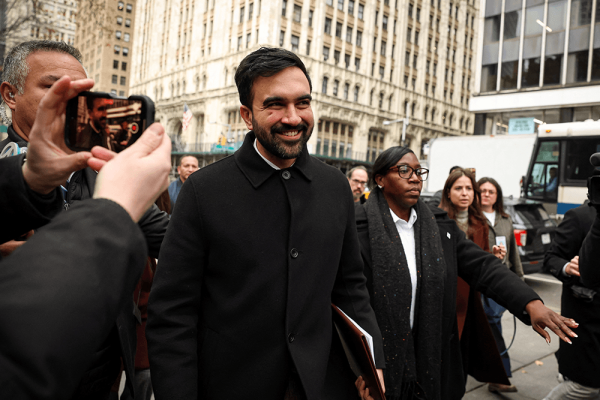Faith leaders are speaking out against Arkansas’ efforts to expand its options for carrying out the death penalty, calling for the state to address the root causes of violence rather than doubling down on punishment.
“Some will say, if you really do the research, you’ll find a more humane way for us to kill each other. I say, if you really do the research, you’ll find the laws that won’t put us in that position to begin with,” said Rev. Paul Beedle of the Unitarian Universalist Church of Little Rock.
Beedle joined more than 40 faith leaders signing onto a letter urging Republican Gov. Sarah Huckabee Sanders to refrain from authorizing nitrogen gas as an execution method. Seven leaders gathered and spoke at the state’s capitol in Little Rock on Aug. 21, then delivered the letter to the governor’s office themselves.
Leaders from a variety of faith traditions said that their appeal was beyond the method of execution. Beedle’s words underscored a common sentiment of the efforts: The death penalty is not a solution to horrible violence; it detracts from more tangible ways to address the root causes of violence while acting as a poor substitute.
Arkansas has not carried out an execution since 2017, after which a drug necessary for its injection procedure expired, leaving the government with limited alternatives to carry out the sentence. This scarcity is the motivation for approving the use of nitrogen gas in executions. Arkansas’ incarcerated population has climbed well above the national average since 2008.
Concerning when the state may resume executions, Sanders’ office referred Sojourners to her statement to the Associated Press in April.
“I think anybody that is rushing into a decision like that is not the one making the decision and doesn’t understand the severity and the responsibility that comes with it,” Sanders said. “I’m certainly not rushing to take action on that. We will be very thoughtful and deliberative as we go through the process.”
READ MORE: Theology From the Execution Room
Rabbi Barry Block of Congregation B’nai Israel in Little Rock told Sojourners that the prospect of state executions via gas was a particularly traumatic one for Jewish people. He said that a lack of hope is a major contributing factor to violent crime and other maladies in the state. That would make instilling hope within communities a guiding solution, and he said the duty should not be relegated to faith leaders alone.
“Our state needs to do a much better job of addressing poverty, of addressing health care, of addressing education, in particular education disparities, which are only being worsened by current policies in the state,” Rabbi Block said. “In particular, it needs to provide hope in communities that are underserved, in minority communities, in rural communities where there is a great deal of despair. I think that that includes … communities that are so frustrated and hopeless that they feel like the only choice is to go with an authoritarianism that puts even more people in prison and death.”
For Block’s part, serving to bolster hope in his community means working on the board of a homeless shelter, staying involved in movements relating to education equality, and staying in conversations with his congregants as their fears of antisemitism in the modern political landscape rise.
The death penalty being indicative of larger, systemic problems means that confronting it requires confronting old wounds. For Rev. Denise Donnell of the New Beginnings Church of Central Arkansas, the death penalty in the U.S. is innately tied to an inhuman system that seeks to harm Black bodies. That means addressing capital punishment will mean confronting systemic problems tied to old national wounds.
“The death penalty comes up as one of those ways that they continue to dehumanize Black bodies,” Donnell said. “You’re only able to do this kind of work and have a death penalty because you can relegate a person to a non-person, to be an object.”
Donnell is focused on centering Blackness in her ministry as a method of healing. She said that the teachings of the Bible have the tools to empower Black Christians in facing and changing the injustices that society perpetuates, like state violence and mass incarceration—issues which have historically disproportionately targeted Black people. For her, the teachings of Jesus are radical in their empathy.
“Those are the conversations that I want to have, that I feel like will free us … We’ll be able to see clearly that, oh no, I really can love my neighbor and do work for my neighbor regardless of the identities that the world has given them. I can see God in them, and I can see how we work together to coexist,” Donnell said.
“Some will say, if you really do the research, you’ll find a more humane way for us to kill each other. I say, if you really do the research, you’ll find the laws that won’t put us in that position to begin with.”—Rev. Paul Beedle.
Got something to say about what you're reading? We value your feedback!






